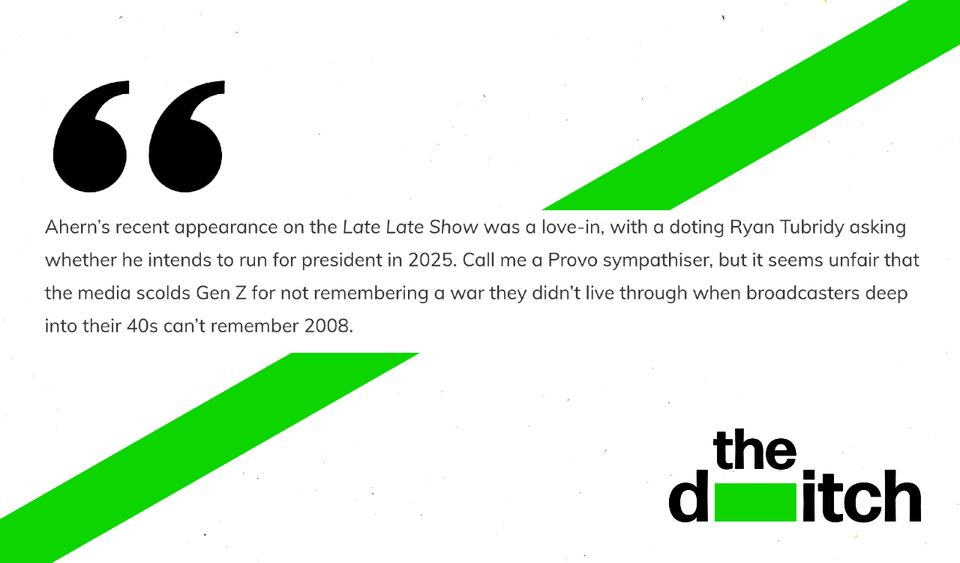In February 2022, during leaders’ questions, Mary Lou McDonald accused Fianna Fáil of exacerbating the housing crisis by giving preferential treatment to so-called cuckoo funds. She then argued that an unpopular decision to gift public land to Bartra had backfired at considerable cost to the taxpayer.
“The private developer awarded the contract for O'Devaney Gardens is threatening to sell 500 family homes to a cuckoo fund unless the government dances to its tune,” said McDonald. “Bartra was given the valuable public land at O'Devaney Gardens effectively for free. Not content with that sweetheart deal, and a huge subsidy from the public purse, it now wants more. It demands that the government buy these homes at inflated prices of more than €400,000, or it says it will sell to a fund, which in turn will fleece people with rip-off rents.”
McDonald went on to reference Fianna Fáil’s well-documented history of corruption. Micheál Martin wasn’t pleased.
“You are the last party to talk to anybody about corruption,” a visibly incensed Martin said, “because your party corrupted public life in this republic for well on 40 years. To a far greater degree than anyone in this country, you corrupted the moral code of our country and our society by the murder and the mayhem that you perpetrated and that you still endorse.”
Translation: Yes, my party, Fianna Fáil has a history of corruption. Yes, we’ve done nothing about the housing crisis – but what about the IRA?
This exchange is typical of how the Troubles are discussed in the Dáil. You don’t have to believe the war waged by the Provisional IRA was justified – nor do you have to sympathise with the republican movement – to have noticed the cynical manner in which southern politicians invoke the conflict when faced with criticism from Sinn Féin.
It's a quarter of a century from the signing of the Good Friday Agreement and the southern establishment sees the Troubles as a punchline to be rolled out whenever politically expedient, as well as a means to condescend to young people looking for an alternative to Fine Gael-Fianna Fáil-Green-Labour rule.
A shiver down his spine
Fianna Fáil and Fine Gael enrich the class of people who support them. In practical terms this means keeping rents and house prices high, ensuring landlords pay limited tax and refusing to enforce laws around planning permission for short-term lets.
With many under the age of 40 now priced out of even renting a home, our political duopoly has a serious problem: the status-quo is becoming an increasingly hard sell, even to affluent middle-class voters who as little as five years ago would have happily supported Fianna Fáil, Fine Gael, Labour or the Green Party.
Whether Sinn Féin - which in February blocked a proposal for rent controls in Belfast – will solve the housing crisis in the south is unclear. But what is clear is that the southern government parties, particularly Fine Gael, have decided to smear them rather than appeal to voters on policy. Even the Sunday Independent, not exactly known for holding Fine Gael to account, has reported that the party devotes more time to criticising Sinn Féin than it does to talking about housing, healthcare or the cost-of-living crisis.
This is where the now historic conflict in the north of Ireland, which ceased with the signing of the Good Friday Agreement 25 years ago, is useful.
Consider the government’s theatrics when Sinn Féin TD Eoin Ó Broin tweeted an image depicting members of An Garda Síochána participating in a 19th century eviction. The image – an accurate portrayal of the police enforcing property rights – prompted outrage from Fine Gael and Fianna Fáil, both of which were desperate to distract from their decision to deliberately raise levels of homelessness across the country.
In an interview with Newstalk, Fine Gael junior minister Patrick O’Donovan said the tweet sent a chill down his spine and that Ireland had seen a frightening preview of life under a Sinn Féin-run Department of Justice. He also mentioned an incident that occurred almost half a century ago involving a man originally from the Limerick parish of Feohanagh–Castlemahon.
“Seamus Quaid was murdered by the IRA in 1980 in Wexford in an absolutely cold-blooded murder,” said O’Donovan. “Down the road,” from where O’Donovan is from in Limerick, “is the parish of Adare, where the IRA came into that village one morning at a post office and riddled Jerry McCabe and left his colleague Ben O’Sullivan for dead.”
Translation: Sinn Féin has no right to criticise the police or their role in evictions because the Provisional IRA killed guards.
Here comes crassness
Ó Broin should not have expressed “regret” over his social media post; politicians must be free to challenge An Garda Síochána.
A more serious threat to Irish democracy and the rule of law would be to preclude them from doing so. Another continuing threat to, or least denigration of, the Irish liberal order are the shameless invocations of an historic conflict to distract from matters of material interest to the public.
And these invocations occur often. According to the KildareStreet website, which provides a searchable archive of everything said in the Dáil, the politician to say “IRA” most frequently over the past two decades or so is Enda Kenny, who mentioned the paramilitary group 120 times.
Kenny is followed by tánaiste Micheál Martin, who mentioned them 67 times. Defending Leo Varadkar for leaking confidential documents three years ago, Martin, rather than address the actual issue, encouraged Sinn Féin to read “an excellent piece of journalism… called ‘Unmasking Stakeknife’”, which “tells an incredibly sordid story of the IRA and Sinn Féin and the work of British intelligence agencies and the infiltration of both”.
Last month during the debate on Labour’s motion on confidence in government, Eoin Ó Broin interrupted Fianna Fáil TD Michael McGrath, who was arguing that the opposition had failed to acknowledge any of the government’s accomplishments. “It is not the IRA Army Council in here,” Stephen Donnelly said. “Other people can speak.”
Other crass references to the Troubles have come from former coalition partners.
When McDonald censured the Fine Gael-Labour government over its cuts to childcare in 2015, Aodhán Ó Ríordáin – who last week, after initially calling on Ó Broin to apologise for his tweet, backtracked and referred to minister O’Donovan’s performance on Newstalk as “pathetic” – said, “Jean McConville could have done with childcare.”
It is legitimate to discuss victims of paramilitary violence on this island. But it takes an astounding level of cynicism to invoke the killing of a mother of ten because your party was criticised for cutting childcare payments after promising voters you wouldn’t do it.
And we know Ó Ríordáin can’t be that concerned with McConville because he never said her name again.
Rewriting history that no one remembers
Apparently no one can recall exactly what happened up north.
A recent Sunday Times poll found that 25 percent of young people are “uneducated” about the Troubles. All age brackets, the poll suggested, have a limited knowledge of key events between 1969 and 1998. Not exactly a revelation: the Irish state made significant efforts to censor information about the conflict in the north as it was taking place. Section 31 of the Broadcasting Authority Act prohibited republicans from speaking on television until 1994.
Responding to the Times poll, Varadkar and Martin criticised the Provisional IRA and Sinn Féin, both of which, the pair said, “seek to rewrite history”. The tánaiste then falsely claimed, in his own rewrite, that the “vast majority” of civilian casualties were at the hands of the Provisional IRA.
The underlying assumption to concerns about rewriting history is this: if the youth truly understood the Troubles and the IRA then they wouldn’t support Sinn Féin. Here’s what Fianna Fáil and Fine Gael can’t grasp: Sinn Féin is popular in the south because of a perception, justified or otherwise, that it is untethered to the rentier class and status quo.
In February The Ditch reported that Des Mackin, Sinn Féin’s finance director, who serves on the party’s ard comhairle, owns ten rental properties and illegally converted an office into a "wholly substandard" apartment. Commenting on the story, Sinn Féin said Mackin’s ownership of so many properties was “entirely a private matter.”
Meanwhile the so-called “peace dividends” promised after the Good Friday Agreement largely failed to materialise for working class people. In a February 2012 paper, academics Brendan Murtagh and Peter Shirlow said devolution in the north has promoted “a mix between ethno-sectarian resource competition and a constantly expanding neoliberal model of governance”.
Not exactly the actions of a vanguard party.
Varadkar and Martin are however correct about one thing: some of us are indeed attempting to rewrite history. As Irish News columnist Brian Feeney observed, Fianna Fáil strategically reintroduced Bertie Ahern to public life in the run-up to Good Friday commemorations because the only other senior Irish political figure left from negotiations is Gerry Adams. He couldn’t be left alone to reminisce with Blair, Clinton and Biden.
Exit Bertie the man who bankrupted the country. Enter Bertie the elder statesman.
Ahern’s recent appearance on the Late Late Show was a love-in, with a doting Ryan Tubridy asking whether he intends to run for president in 2025. Call me a Provo sympathiser, but it seems unfair that the media scolds Gen Z for not remembering a war they didn’t live through when broadcasters deep into their 40s can’t remember 2008.
It may be true that young people, like previous generations, don’t fully understand all the nuances of the Troubles – but they can intuit that the conflict is often referenced in bad faith, devoid of context. No amount of scaremongering about Sinn Féin not being “a normal party” or shrieking about a football team chanting “Up the Ra” will change this.
One of the purposes of the Good Friday Agreement was to invite the republican movement to end its armed struggle and fully participate, for better or indeed for worse, in Ireland’s political institutions, both north and south.
Now, 25 years on, it’s time to let them do it.


